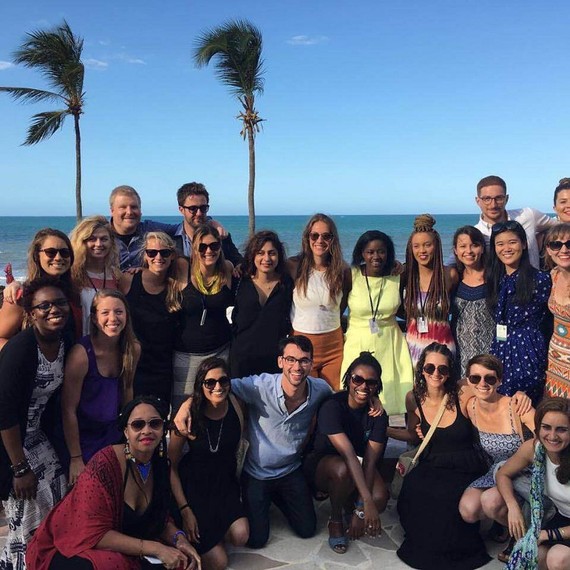This piece is adapted from a public narrative presentation I gave in July 2016 at the Global Health Corps end of year retreat in Tanzania. It first appeared on Global Health Corps' Medium Blog, AMPLIFY
Reflecting on my past year as a Global Health Corps fellow, I wanted to talk a bit about identity, ideology, and social change. Although this is my personal narrative, I believe that shrinking our identity and moving past ideology as much as one can are key steps to maximizing the positive impact that we have on the world. In my view, the most effective advocates understand their own intellectual priors about the world, constantly test and update their assumptions, and are willing to adopt conclusions that conflict with social or personal expectations.
Nate Silver recently talked about this set of ideas using an old philosophy fable involving a fox and a hedgehog. In the story, foxes are able to do a lot of things: they dig, run, hide, disguise themselves, and are otherwise pretty difficult for hunters to catch. In contrast, hedgehogs can only do one thing: they curl up into a ball.
Instead of trying to simplify our entire experience into a narrow worldview that we can apply to all situations, we should be intellectually curious enough to seek out answers from a variety of sources, understand opinions that we may not agree with, and change our opinions when we gain new information.
The lesson here is that we should be like foxes. Instead of trying to simplify our entire experience into a narrow worldview that we can apply to all situations, we should be intellectually curious enough to seek out answers from a variety of sources, understand opinions that we may not agree with, and change our opinions when we gain new information.
Of course, in practice, this is emotionally and intellectually taxing. We now have access to an absurd amount of information and no shortage of diverse viewpoints -- how can we be expected to process them?
The answer, for me, has been Effective Altruism and consequentialist thinking more broadly. Effective Altruism asks the question, "How can we accomplish the most good in the world?" Importantly, Effective Altruism is not a set of answers or a pre-defined ideology, but a worldview that attempts to apply evidence and reason to arrive at better answers than before. Effective Altruists are always updating, always learning, and never believe that we have arrived at the "right" answer about how to best improve the lives of others.
I discovered Effective Altruism in high school, when a teacher I still admire was raising money for a global health non-profit. Understanding that other organizations could have a larger impact, I decided to research and raise money for a cause where I knew my dollars would save more lives and cure more disease. As I read the evidence, I was shocked by how important cost-effectiveness is in global health: for example, the least effective HIV/AIDS intervention accomplishes 0.1% of the health impact per dollar invested as the most effective -- choosing the right intervention is literally a life or death decision. I ended up raising about $3000 for a charity that focuses on Vitamin-A supplementation, an intervention that still stands as one of the most cost-effective and evidence-based we have today. Although I've since found more effective organizations to support, this learning experience was an important step in my progression as a global health advocate.
Thinking more abstractly, I believe that philosophical "goodness" is defined by the net balance of well-being and suffering in the world. I chose to work in global health because it is an especially promising field to have a positive impact where I have a personal comparative advantage. However, in the past, I have considered other fields that are potentially high-impact, like building the movement to end factory farming, influencing long-term thinking as a consequentialist philosopher, or minimizing the long-term risks of things that could end humanity, like climate change, nuclear warfare, pandemics, and artificial intelligence.
I recognize that some people will point out the irony of me suggesting Effective Altruism as an "answer" to how to pursue social change in a talk that I originally introduced as about the limits of ideology and identity. However, I want to emphasize that for me, Effective Altruism does not suggest a set of answers, but instead merely provides a structure for how to evaluate the world. This structure has been essential for me in terms of weighing ideas, updating my assumptions, and testing out strategies for how to improve the world.
My experience of finding out how to have the largest impact on the world has been extremely rewarding in terms of adding meaning and purpose to my life, but it also requires me to remove assumptions that would be easier to let lay. As humans, our default worldview is one of ideological comfort. We often concoct elaborate means to prevent our assumptions from beig tested or probed with any rigor. It is this static stance that foxes actively fight against by adopting new opinions when information changes and pursuing unpopular thoughts when logic demands it.
The correct approach to social change is not about finding the answer, but finding the questions that spring from questions. It is iterative and endless, somehow managing to be both frustrating and fulfilling at the same time.
However, social change is not about me or you -- it's about the consequences that we create. Identity and ideology fall away when we merely consider the impact that we are having. There is no greater challenge than attempting to strip away the mental barriers that prevent us from considering more high-impact activities. So I ask you: are you sure that you are doing the most high-impact thing you could be doing?
Because I'm not.

